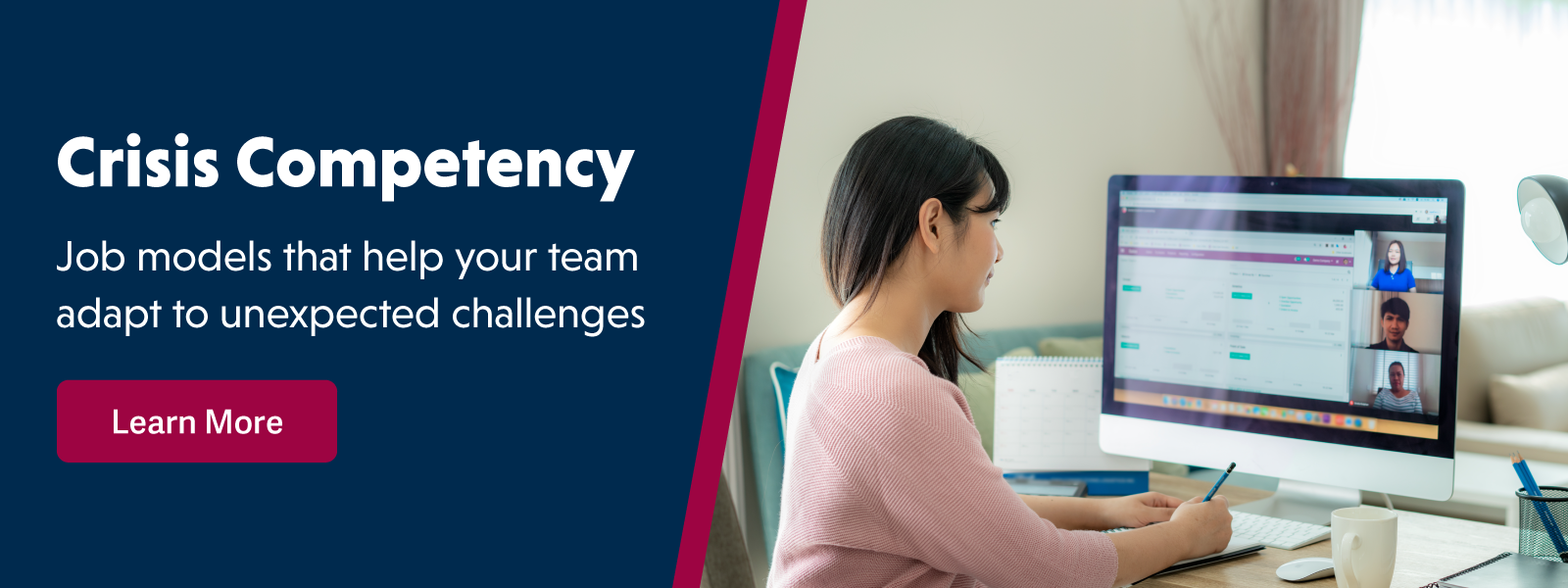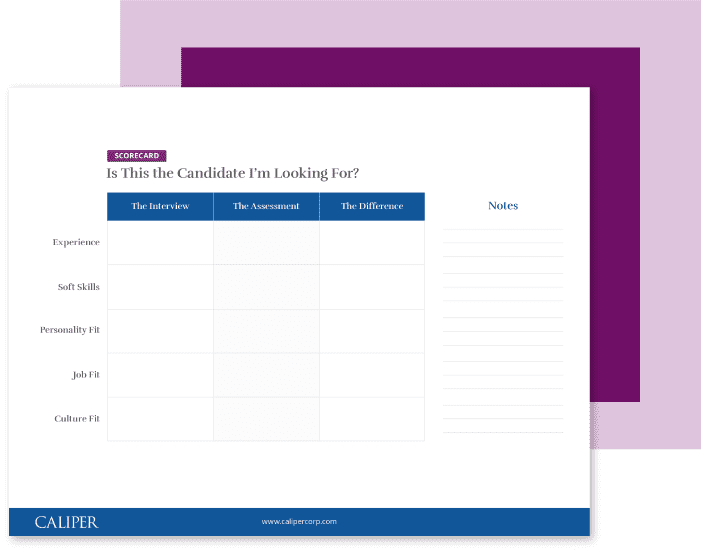During a time of turmoil, placing emphasis on your professional development and goals has never been more important. Setting goals during a crisis helps to motivate and align your team’s work, and employees working toward a clearly defined goal have shown higher rates of persistence when facing challenges. In times of uncertainty, collaborating as a team to set goals for your work can help to ease stress and provide much-needed support and clarity. Emphasizing professional development with your team will make them more resilient and prepared for the challenges they’ll be facing.
How should managers approach setting professional development goals during a crisis? Through frequent reflection and heightened collaboration, managers can centralize their teams and remain focused on the success of their organization.
Assess Your Current Goals
It is essential to center yourself in times of crisis and reflect on your current situation before making any decisions. While the initial reaction may be to make a quick change or switch up how things operate, you may find that much of your current processes still work and apply to your new situation.
Studies have shown that by 2022, over half of all employees will require #upskilling at their job. @CaliperCorp breaks down the need to improve employee skills, even during a #crisis: Click To TweetThe first question you should ask yourself when assessing your professional development goals in a time of crisis is which goals are still relevant. A majority of the goals you created before a crisis may no longer apply to your current environment, but parts of those goals may still be applicable. When reviewing your goals, you may find that some simply need adjustments to timelines, some may require no adjustments at all, and some may need to be scrapped entirely. Some questions to assist with your reflection are:
- Are we targeting the right goals?
- Are the goals we are setting challenging us professionally?
- Do these goals help us develop in our careers?
- Are the goals we have currently still achievable in our current landscape?
- Does the timeline we’ve placed on these goals still apply?
Asking yourself these reflective questions will help you narrow down your goals and highlight what aspects need to be adapted or addressed. This method also enables you to identify the goals that are no longer relevant to narrow your focus on achieving the successes that matter.
Adapt Your Professional Development Goals for the Current Work Environment
You’ve reviewed and analyzed your current goals, and you know which goals need to be discarded and which ones need some extra attention. How, then, do you move forward with reworking your professional development goals during a crisis? Many experts say that it is easier and more feasible to break down your goals into smaller categories. One way to do this is by looking at your goals from an organizational, departmental, and individual level.
Organizational. Organizational goals are crucial to the success of any business, especially in times of crisis. Having clearly defined organizational missions and goals keeps employees focused on what matters and gives them a sense of commitment to the team. When looking at your organizational goals, ask yourself:
- What makes sense for our company to focus on right now?
- Is this goal something we can achieve?
- What are the short and long-term effects of working toward this goal?
Departmental. Departmental goals are an excellent opportunity for collaboration among teams. Organizations can work together to determine what their department should strive for and can communicate openly about the challenges or roadblocks they’ve encountered due to crisis. Professional development goals don’t always have to be individual. Working together with your team to learn new skills or better your current practices can lead to higher levels of trust in your organization. Once your organization has outlined the adapted goals, talk with your teams, and discuss:
- How can our department provide the most significant impact possible toward our new goals?
- Are we offering ourselves the space to learn new skills and try new things?
- Are there any team goals we currently have that are no longer achievable?
Individual. The individual goals are a great area for employees to take ownership of the work and become engaged with the overall mission. Managers should take advantage of these opportunities to coach their employees and become involved with their own professional development goals. Research has shown that individuals often set higher goals for themselves when they have a voice in creating them. Talk with your employees to find out what they would like to achieve professionally. Do they want to learn a new trade? Are they interested in taking on a new role at work? Allow employees the space to determine the answers to questions such as:
- How does my role/goal play into the larger goals of this organization?
- Do my goals inspire me to work? Do they challenge me to do my best work?
- Do my goals enable me to develop myself professionally?
Looking at your professional development goals from these different perspectives should provide you with more in-depth insight into how you and your team will navigate a crisis. As everyone knows, a crisis means change will happen frequently. So, while you work your way through these changes, set shorter timelines for yourself. Allowing you more flexibility in your work and will give you the space you need to adjust quickly.
Allow for Professional Development
During the pandemic, many employees found themselves performing tasks outside of their daily responsibilities. Many organizations have reworked positions to fit within existing roles or have been forced to narrow down their staff. One way to keep employees on task and equip them with the tools they need to succeed is with professional development. The best way to develop your employees’ skills during a crisis is by upskilling, re-skilling, and improving soft skills.
@CaliperCorp says in times of #crisis, it is important to center yourself and reflect on your #goals. See what questions you should ask yourself in their latest blog: Click To TweetUpskilling. Studies have shown that by 2022, over half of all employees will require upskilling at their job. Upskilling involves training employees on new skills to help them do their work more efficiently and productively. By getting ahead of the gate, your organization can equip employees with tools to help them work through these current challenges and prepare them for future changes.
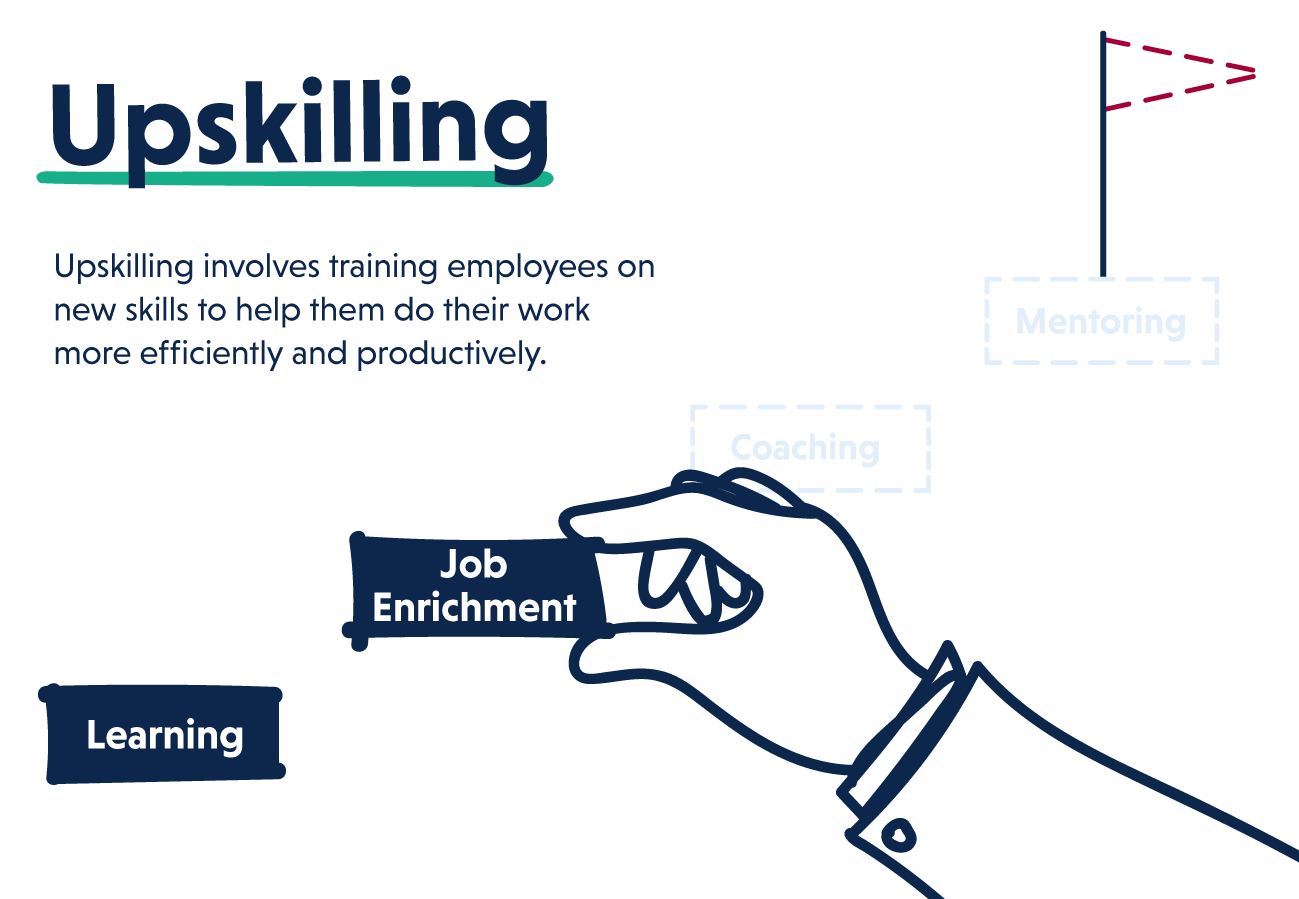
Reskilling & Cross-Training. Reskilling is retraining current employees to take on different roles within your organization, which could mean one less employee that has to be let go during reorganization or layoffs. Cross-training involves training employees on how to perform the tasks and responsibilities of other departments. This is a tremendous advantage during a crisis, as it allows flexibility in your departments since employees can help shoulder the burdens and assist with specific functions. Proper reskilling and cross-training saves you money on replacing open positions, creates a more invested and mobilized workforce, and even raises engagement levels.
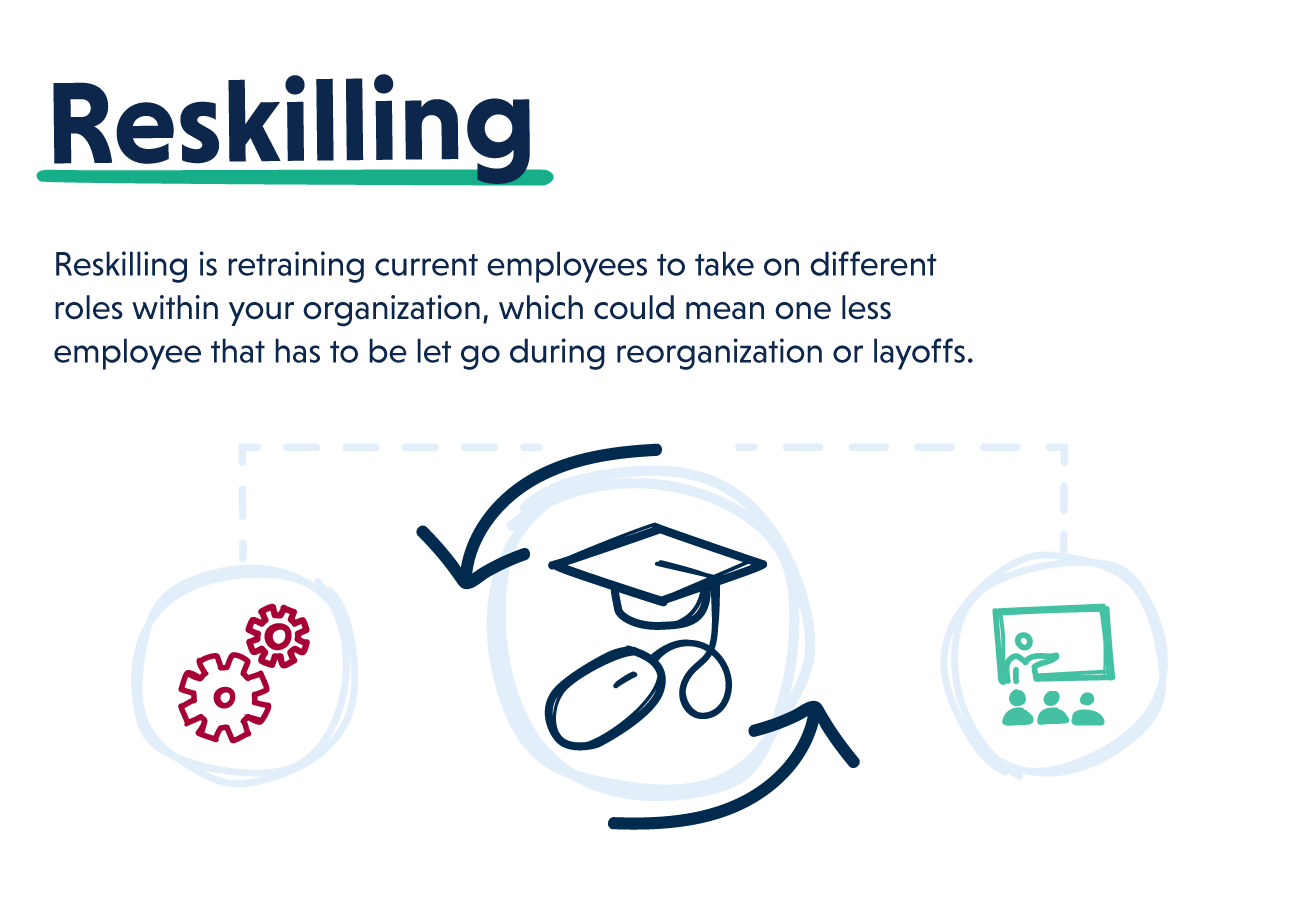
Improving soft skills. Soft skills are wildly crucial in a productive organization. Employers have recognized that hiring for soft skills often leads to stronger quality candidates and higher-performing employees. Soft skills are tougher to learn, such as active listening, collaboration skills, and communicating effectively. As you and your organizations prepare for the new year, incorporate opportunities for your team to better their skillset. Both your organization and your employees will see benefits such as increased productivity, higher retention rates, and improved teamwork — all things that will help you to improve your resilience for future disruptions.
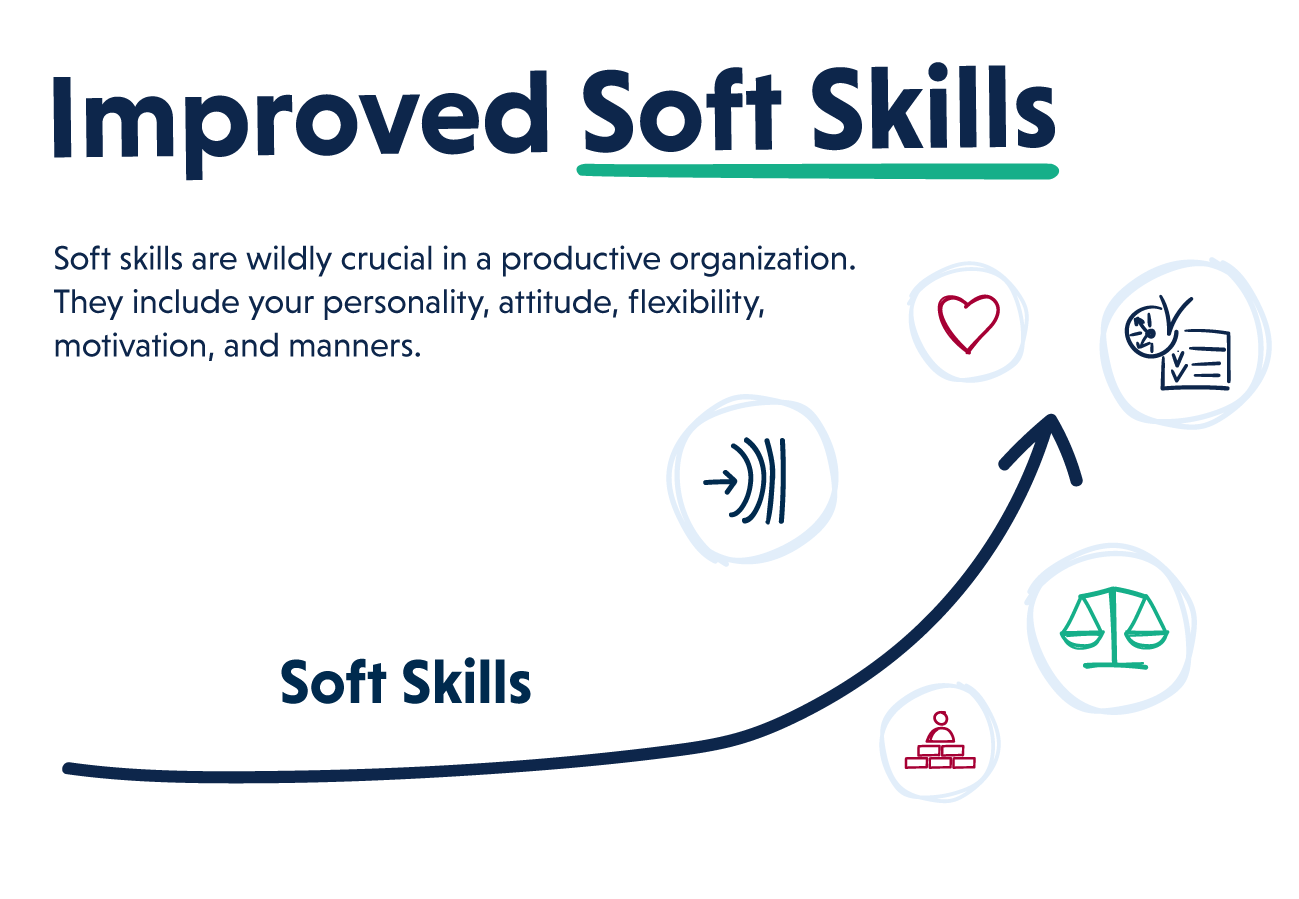 Review and Revise Frequently
Review and Revise Frequently
When setting goals during a crisis, reviewing and revising your goals frequently is essential. The volatile environment means that you will need to regularly adjust your processes and goals to fit the current situation. Over the last year, short-term goals have taken on a new meaning. What once were monthly or quarterly goals are now being approached as weekly objectives. Work within your organization and department to check in weekly or monthly to see whether your goals are still being met. Not only will this help you to ensure your goals are in alignment with the overall mission, but it also serves as a way of keeping one another accountable.
Times of crisis can make or break a team based on their ability to respond to changes, adjust their goals, and hold each other accountable. As your organization approaches goal setting during a crisis, remember to adjust your expectations and timelines. While crises may seem overwhelming, there is comfort in knowing that things will settle down eventually. Offering your employees the support they need to navigate these changes will help you build a more resilient and productive team.
To help stay ahead of changes, you need to provide your team with the training they need to improve their skill-set and further their career. To learn more about how Caliper can assist in your teams’ professional development, reach out to one of our experts, or sign up now for your free demo.

